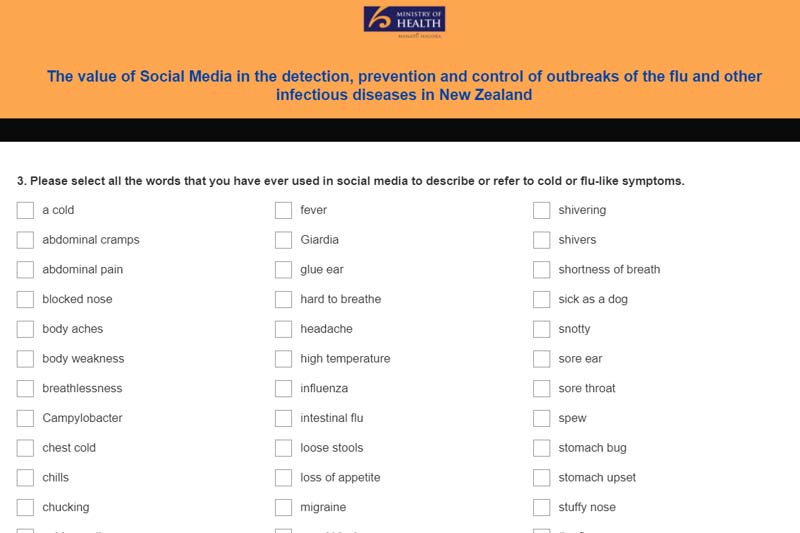
Image: Screenshot from ongoing online survey asking people if they’ve ever posted information social media about themselves or their family’s illnesses/ Credit: Ministry of Health, New Zealand
The Health Minister of New Zealand, Mr. Jonathan Coleman revealed that a new project is seeking to establish if tracking trends on social media and unconventional data can help predict outbreaks and further improve our responses to epidemics.
Minister Coleman said,“We’re in the midst of the cold and flu season, so trying to predict outbreaks of infectious bugs is top of mind. The Ministry of Health is trialling an innovative approach aimed at improving our response to epidemics by predicting outbreaks earlier.”
The project leverages alternative sources of information, including social media and a range of historic and current data sets, to detect trends that indicate the spread of infectious diseases.
The data being harnessed in addition to social media includes anonymised information about school absenteeism, employee sick leave, pharmacy sales of over-the-counter medicines, Healthline calls (Healthline is New Zealand’s national telephone triage and health service, funded by the Ministry of Health and provided by Homecare Medical since November 2015) and tissue sales.
There have been claims that luxury soft tissue sales surge at the start of influenza outbreaks. So, the project will analyse data on tissue sales to see whether not just the sale volumes but the types of products can act as an early epidemic warning.
People often post about being unwell on social media platforms, like Facebook and Twitter, and the data can enable the detection of trends. Picking up on trends could help the Ministry of Health to put appropriate measures in place earlier to prevent the disease from spreading, and ensure sufficient stocks of medicines are available.
This project builds on existing monitoring programmes which work well to identify trends in communicable diseases using traditional methods, such as surveillance of lab results and data from general practices. The information is anonymised – it’s about numbers of cases, not the individuals.
There’s currently an online survey that asks people if they’ve ever posted information social media about themselves or their family’s illnesses. It has questions on the social platforms, the words used by the respondent to describe or refer to cold or flu-like symptoms. It also tries to gauge the willingness of people to use a short online form (like the one in the featured image above) to anonymously tell the Ministry when they or someone in their family is sick with flu-like symptoms.
The project is supported by the $888 million extra invested into Vote Health this year, taking it to a record $16.8 billion.
Instances of use of social media for tracking diseases
There have been several initiatives in recent years, where the use of information from social media for tracking the spread of diseases has been explored.
For example, during the H1N1 flu pandemic in 2009, the Centers for Disease Control and Prevention (CDC) in the US took advantage of social media posts made by users about possible symptoms and claims of possible outbreak of the H1N1 virus. In addition to traditional communication tools, social media was made an integral part of the outreach programme. In 2013, CDC launched the “Predict the Influenza Season Challenge” for participants to predicts the timing, peak and intensity of the 2013-2014 flu season using social media data.
HealthMap, a freely accessible, automated electronic information system for monitoring, organising, and visualising reports of global disease outbreaks, which incorporates social media data, noted a “mystery hemorrhagic fever” spreading in Guinea nine days before the WHO issued its first statement on the outbreak of Ebola.
















